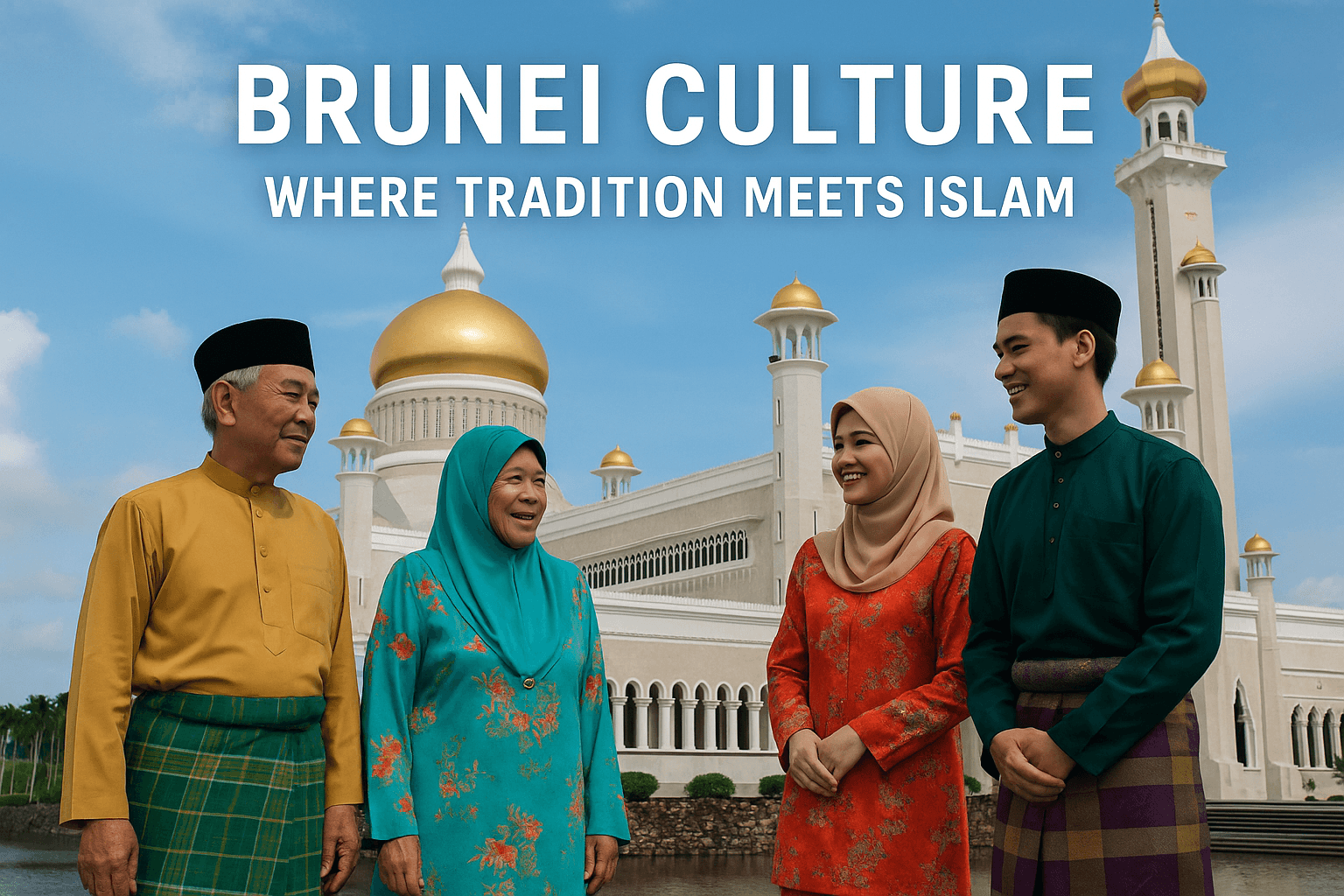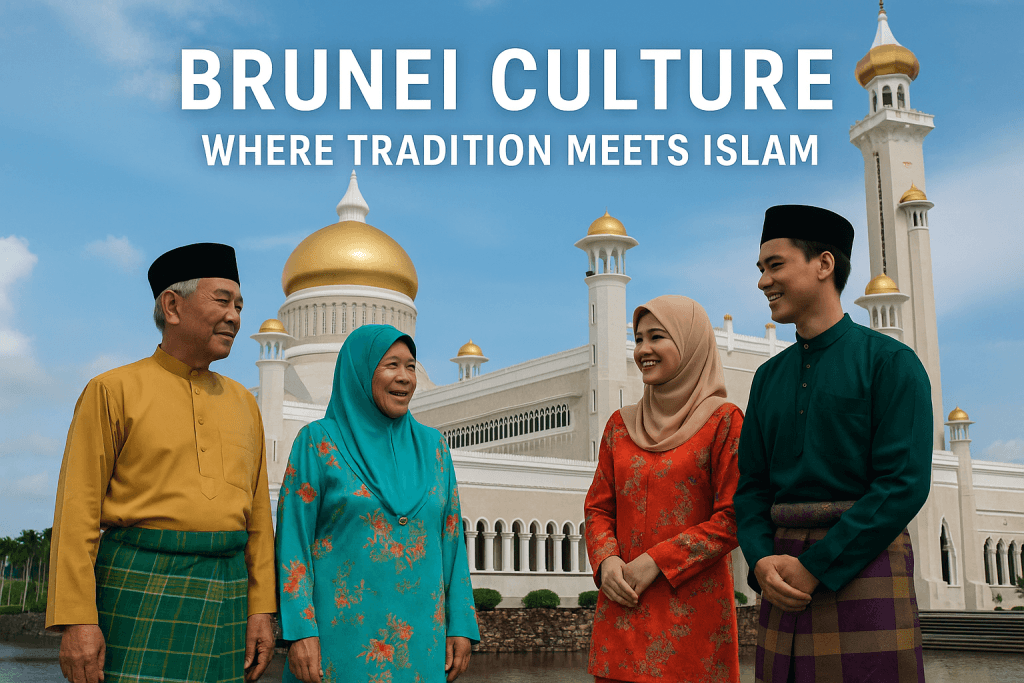The Sultanate of Brunei Darussalam, a small yet culturally rich nation located on the island of Borneo in Southeast Asia, is known worldwide for its unique blend of tradition, religion, and modern identity. Central to this identity is the concept of Brunei Culture Where Tradition Meets Islam, a way of life that integrates centuries of Malay customs with deep Islamic values. This synthesis has shaped the nation’s laws, governance, daily practices, and social structure, creating a society where faith and heritage coexist harmoniously.
Understanding Brunei Culture Where Tradition Meets Islam requires a closer look at the historical foundations of the country, the spread of Islam among the Malay people, and how these influences manifest in daily life, social etiquette, religious observances, governance, and cultural arts. The relationship between traditional Malay identity and Islam is not one of conflict but of unity, creating a cultural model that emphasizes continuity, respect, and devotion.
This article provides an in-depth exploration of Brunei Culture Where Tradition Meets Islam, examining its evolution, its role in shaping national identity, and its impact on various aspects of society.

Historical Foundations of Brunei Culture
Pre-Islamic Malay Heritage
Before Islam became dominant, the indigenous people of Brunei practiced animism and were influenced by Hindu-Buddhist traditions from neighboring kingdoms. Customs such as respect for elders, community gatherings, and oral storytelling were central to life. These practices laid the foundation for what later became elements of Brunei Culture Where Tradition Meets Islam, ensuring continuity even as religion reshaped values.
Arrival of Islam
Islam was introduced to Brunei around the 14th century through trade and diplomacy. The conversion of local rulers marked a turning point, as Islam became the guiding principle for governance and society. This transition was not abrupt but blended with existing traditions, resulting in a uniquely Bruneian synthesis of Malay customs and Islamic law.
The Sultanate and Islamic Leadership
Brunei’s monarchy has been closely tied to Islam since its earliest days. The Sultan is not only the head of state but also the protector of the faith, ensuring that Brunei Culture Where Tradition Meets Islam remains central to national identity. This dual role has reinforced the intertwining of governance, culture, and religion.
Core Principles of Brunei Culture
Faith as a Foundation
Islam is more than a religion in Brunei—it is a way of life. Daily prayers, modest dress, and adherence to halal practices are deeply ingrained. These practices define Brunei Culture Where Tradition Meets Islam and shape the values of respect, humility, and devotion.
Malay Identity
Despite the strong Islamic influence, Brunei retains its Malay cultural roots. The Malay language, customs, and family structures remain essential, blending seamlessly with Islamic teachings. The phrase “Melayu Islam Beraja” (Malay Islamic Monarchy) captures this cultural framework and underlines the unity of tradition and religion.
Social Harmony
One of the hallmarks of Brunei Culture Where Tradition Meets Islam is the emphasis on harmony. Society is guided by values of respect for authority, kindness to neighbors, and strong family ties. Traditional gatherings, ceremonies, and communal activities strengthen this bond.
Religion in Daily Life
Islamic Practices
From the call to prayer echoing through mosques to the fasting month of Ramadan, Islamic practices are visible in every aspect of Brunei’s daily life. These practices reinforce the meaning of Brunei Culture Where Tradition Meets Islam by ensuring that faith guides both personal behavior and social interaction.
Festivals and Celebrations
Islamic festivals such as Hari Raya Aidilfitri and Hari Raya Aidiladha are celebrated with great enthusiasm. These events not only highlight religious devotion but also showcase Bruneian hospitality and community spirit. Traditional food, cultural attire, and open houses exemplify how tradition and Islam converge in festive settings.
Role of the Mosque
The mosque is a central institution in Brunei. It is not only a place of worship but also a center for learning, community activities, and cultural preservation. The grandeur of structures like Sultan Omar Ali Saifuddien Mosque symbolizes the majesty of Brunei Culture Where Tradition Meets Islam.
Governance and National Identity
Melayu Islam Beraja (MIB)
The national philosophy of MIB—Malay Islamic Monarchy—captures the essence of Brunei Culture Where Tradition Meets Islam. This philosophy emphasizes the preservation of Malay culture, the supremacy of Islam, and the central role of the monarchy.
Sharia Law
Brunei has implemented aspects of Sharia law as part of its governance system. This reflects the deep integration of religion into law, ensuring that the nation remains true to its cultural and religious identity.
Preservation of Tradition
Even in modernization, Brunei remains committed to preserving traditional values. Policies support the teaching of Islamic principles, cultural studies, and the Malay language, ensuring future generations understand Brunei Culture Where Tradition Meets Islam.
Language and Literature
The Malay Language
Bahasa Melayu is the official language of Brunei and serves as a medium for transmitting tradition and religious knowledge. The language embodies the values of respect, humility, and spirituality central to Brunei Culture Where Tradition Meets Islam.
Oral Traditions and Literature
Poetry, proverbs, and storytelling remain significant in Brunei’s literary culture. Many works integrate Islamic themes, reinforcing the religious dimension of cultural expression. This combination highlights the fusion of heritage and faith.
Cultural Arts and Expression
Traditional Music and Dance
Bruneian music and dance forms, such as Adai-Adai and Zapin, are rooted in Malay tradition but have been shaped by Islamic values, emphasizing modesty and grace. Performances are not merely entertainment but expressions of identity and faith.
Visual Arts and Calligraphy
Islamic calligraphy is a celebrated art form in Brunei, reflecting the sacredness of the written word. Traditional crafts, such as weaving and silverwork, also integrate motifs inspired by both Malay heritage and Islamic patterns.
Architecture
Brunei’s architecture showcases the blend of tradition and religion. Palaces, mosques, and traditional houses reflect Islamic design principles while preserving Malay aesthetics. The harmony of these elements exemplifies Brunei Culture Where Tradition Meets Islam.
Family and Social Structures
Importance of Family
Family remains central in Brunei. Respect for parents, strong kinship ties, and collective responsibility align with both Malay tradition and Islamic teachings. This unity reinforces the values of Brunei Culture Where Tradition Meets Islam in daily life.
Gender Roles
Islamic teachings guide gender roles, emphasizing modesty, respect, and shared responsibilities. Women play active roles in education, healthcare, and community leadership, while still upholding traditional values of family care and social harmony.
Education
Education in Brunei integrates both secular and religious teachings. The curriculum emphasizes Islamic studies alongside modern sciences, preparing youth to carry forward the ideals of Brunei Culture Where Tradition Meets Islam.
Food and Culinary Heritage
Halal Practices
Food in Brunei strictly follows halal guidelines, reflecting the importance of Islam in daily life. Traditional Malay dishes are prepared in ways that respect both religious requirements and cultural taste.
Celebratory Foods
During Islamic festivals, traditional dishes such as Nasi Katok, Satay, and Ambuyat are shared among families and neighbors. These foods symbolize unity and hospitality, key values of Brunei Culture Where Tradition Meets Islam.
Culinary Identity
The cuisine of Brunei is a blend of Malay heritage, Islamic dietary laws, and influences from neighboring regions. This fusion reflects the broader cultural identity of the nation.
Modernity and Globalization
Balancing Tradition and Progress
Brunei faces the challenge of modernization while preserving tradition. The government and society actively ensure that technological advancement does not erode the principles of Brunei Culture Where Tradition Meets Islam.
Tourism and Cultural Diplomacy
Brunei promotes itself internationally as a nation where Islamic values harmonize with traditional heritage. This identity attracts visitors seeking cultural authenticity and religious harmony.
Youth and Digital Culture
The younger generation embraces digital platforms while remaining deeply rooted in Islamic and Malay traditions. Social media is used to promote cultural events, Islamic teachings, and national identity.
Challenges and Opportunities
Cultural Preservation
Globalization poses risks to cultural preservation. However, Brunei’s strong commitment to its national philosophy ensures the endurance of Brunei Culture Where Tradition Meets Islam.
Religious Integrity
Maintaining the integrity of Islamic practices in a changing world is a challenge. Educational programs and religious institutions play key roles in addressing this issue.
International Recognition
Brunei has the opportunity to position itself as a model of cultural and religious integration. Promoting Brunei Culture Where Tradition Meets Islam globally can enhance its soft power and international standing.
Conclusion
The essence of Brunei Culture Where Tradition Meets Islam lies in the seamless fusion of Malay heritage with Islamic values. This integration defines the nation’s identity, guides its governance, and shapes its daily life. From architecture and cuisine to education and family life, every aspect of Brunei reflects this unique cultural framework.
By maintaining its philosophy of Melayu Islam Beraja, Brunei ensures that tradition and religion remain at the heart of its national character. This balance offers valuable lessons for the world on how culture and faith can coexist harmoniously in modern society.
Brunei Culture Where Tradition Meets Islam is not simply a slogan—it is a living reality that continues to define the past, present, and future of this remarkable nation.

